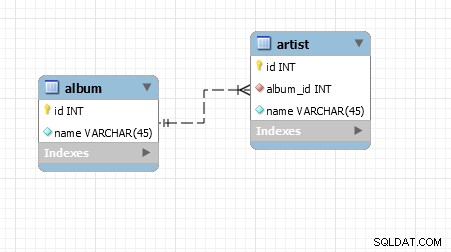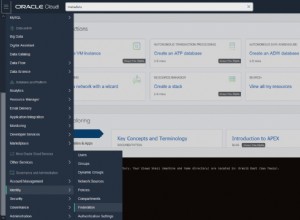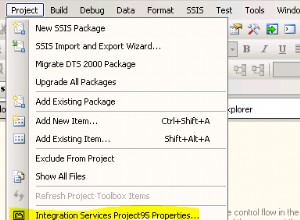Ci sono molti modi per avvicinarsi a questo, questo è uno di questi. Supponiamo che tu abbia uno schema db simile a questo:

Ora puoi avere AlbumMapper e ArtistMapper responsabili del recupero di quegli oggetti dal db per te:
interface AlbumMapper {
/**
* Fetches the albums from the db based on criteria
* @param type $albumCriteria
* @param ArtistMapper $artistMapper
*
* Note: the ArtistMapper here can be also made optional depends on your app
*/
public function fetchBySomeCriteria($albumCriteria, ArtistMapper $artistMapper);
}
interface ArtistMapper {
/**
* @param array $ids
* @return Artist[]
*/
public function fetchByAlbumIds(array $ids);
}
Ho messo che AlbumMapper richiede ArtistMapper, quindi con questo mappatore gli album vengono sempre restituiti con i loro artisti. Ora un'implementazione di esempio può essere come questa in cui utilizzo un piccolo trucco di indicizzazione per collegare l'artista agli album:
class ConcreteAlbumMapper implements AlbumMapper {
public function fetchBySomeCriteria($albumCriteria, ArtistMapper $artistMapper) {
//sql for fetching rows from album table based on album criteria
$albums = array();
foreach ($albumRows as $albumRow) {
$albums[$albumRow['id']] = new Album($albumRow);
}
$artists = $artistMapper->fetchByAlbumIds(array_keys($albums));
//marrying album and artists
foreach ($artists as $artist) {
/**
* not crazy about the getAlbumId() part, would be better to say
* $artist->attachYourselfToAnAlbumFromThisIndexedCollection($albums);
* but going with this for simplicity
*/
$albums[$artist->getAlbumId()]->addArtist($artist);
}
return $albums;
}
}
In questo caso il tuo Album sarà sulla falsariga di:
class Album {
private $id;
private $title;
private $artists = array();
public function __construct($data) {
//initialize fields
}
public function addArtist(Artist $artist) {
$this->artists[] = $artist;
}
}
Alla fine di tutto questo dovresti avere una collezione di oggetti Album inizializzati con i loro Artisti.




